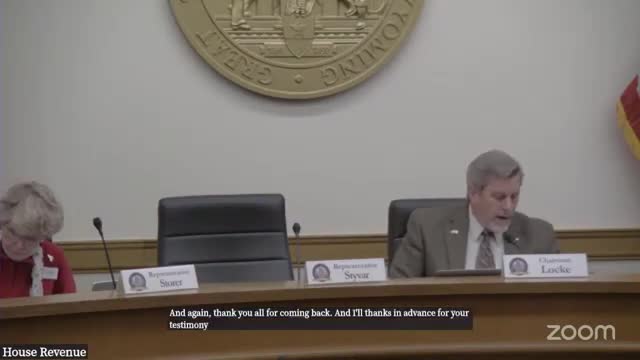House Revenue Committee advances two-year homeowner tax exemption, 8-1
Get AI-powered insights, summaries, and transcripts
Subscribe
Summary
The House Revenue Committee gave House Bill 169 a do-pass recommendation after testimony from municipal leaders, the Secretary of State and the Department of Revenue about local revenue impacts, backfill language and interactions with a citizens' initiative.
The House Revenue Committee voted 8-1 to give House Bill 169 — a two-year homeowner property tax exemption for tax years 2025 and 2026 — a do-pass recommendation after public testimony and amendments.
The bill would exempt part of residential property value from property tax for those two years and includes a state appropriation intended to backfill 50% of lost local revenue in each year; the appropriation would be prorated if total requests exceed available funding, Department of Revenue staff told the committee.
Municipal officials warned the committee the measure, as written, would reduce local revenues in ways that could force cuts to services. Ashley Harpstreith, executive director of the Wyoming Association of Municipalities, said WAM opposes the bill in its current form because the proposed state backfill is partial and not guaranteed in later years. "We are really concerned and are in opposition at this point," Harpstreith told the committee, and cited city-by-city estimates she said WAM had prepared: Casper could lose about $2,200,000 in the first year; Evanston about $500,000; Mountain View about $60,000.
Cheyenne City Councilwoman Kathy Emmons told the committee Cheyenne levies the full eight mills allowed by statute and estimated the city would lose $2,970,000 for fiscal 2025 if the bill passes without full backfill. Emmons said payroll comprises roughly 72.9% of Cheyenne's general fund and that, based on that budget structure, the city would likely have no choice but to cut personnel to absorb the loss. "In the best case scenario, we would need to cut 30 positions to offset the reductions in property tax revenue," Emmons said, adding that estimates of total staffing impacts could reach "40 to 50 positions overall." Emmons also provided example compensation figures: an entry-level firefighter, including salary and benefits, was about $107,000, and a starting police officer with benefits was about $103,479.
Secretary of State Chuck Gray testified in support of the committee bill and described the longer history of property-tax proposals and a related citizens' initiative. Gray said his office has certified the initiative petition and estimated "over 30,000" signatures, later noting it was about 31,000. He urged inclusion of language in the bill intended to make clear the two-year exemption is not "substantially the same" as the citizens' initiative so the initiative process would not be blocked under state law.
Department of Revenue Director Henson and staff answered technical questions about implementation and fiscal effects. Director Henson told the committee the bill's backfill is structured as a 50% payment for each of the two years and that the appropriation will be prorated if insufficient. She said the department will not know the total assessed value subject to the exemption until September 2025 and reminded members other recent tax changes (for example, the 4% cap and the long-term homeowners exemption) have differing backfill treatments: the long-term homeowners exemption that takes effect in 2025 does not contain a state backfill. Henson also summarized how property-tax mills are distributed for education: a 12-mill school foundation mill, a 25-mill local school support mill, and a 6-mill county school fund mill, and noted the University of Wyoming receives no property-tax dollars.
Representatives of the Wyoming Hospital Association raised concerns about impacts on special hospital districts and critical access hospitals. Josh Hannes said of Wyoming's 28 hospitals, 15 are special hospital districts that rely on levies; he added that Wyoming's 19 critical access hospitals each had a negative net operating margin in 2023, and asked the committee to consider hospital operating pressures when evaluating tax reductions.
Committee debate produced three notable amendment attempts. The committee adopted an amendment clarifying a property may not receive this bill's exemption in the same tax year if it already receives the long-term homeowners exemption (the amendment's language was to be drafted by LSO to reflect that intent). An amendment to delete the bill's $1,000,000 cap on the value subject to the exemption failed. A separate amendment to change the exemption percentage from 50% to 25% was introduced and subsequently withdrawn.
Representative Riggins moved the bill out of committee; Representative Lean seconded. On a roll-call vote the committee recorded eight ayes and one no: Representatives Brown (Aye), Campbell (Aye), Lean (Aye), Lucas (Aye), Riggins (Aye), Storer (No), Steibar (Aye), Wharf (Aye) and Chairman Locke (Aye). The committee reported the bill "do pass."
The bill will now proceed to the full House for further consideration and possible floor amendment. The Department of Revenue told members it will provide updated fiscal figures when more current assessed-value data are available in September 2025.
